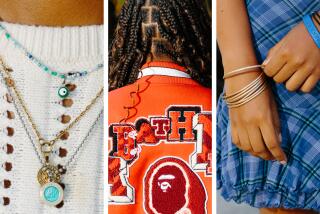SOUTH : KJLH Gives Youths On-the-Air Training
- Share via
In an age of television and music videos, radio may not be as hot as when it was the world’s sole electronic mass medium. But a group of Washington Preparatory High School students participating in a pilot project at KJLH-FM (102.3) has begun to reconsider the merits of radio broadcasting.
In the “Voices” project, 15 students from the South Los Angeles school are learning basic radio production skills by preparing opinion pieces on issues ranging from police brutality to sexual harassment.
“We listen differently to radio now,” said Regina Edmond, 17. “It (radio) can be an unbiased news source without the pictures and everything. Radio is better than television in that respect.”
Many students said they hoped to use the skills they learn at KJLH in other jobs.
“I want to be a news reporter for television,” said Mayet Branch, a 17-year-old senior. “But when I heard about the program, I jumped to it. I figured I could learn something about what I wanted to do.”
Sponsored by KJLH and RadioWest, a nonprofit organization of independent radio producers, the project is funded by a $3,000 grant from the Arts Recovery Fund of the Cultural Affairs Department.
“When I organized it, I thought it would be a means of artistic empowerment by creating a structure for the students to express themselves,” said Kathy Gronau, the project director. “Because they are young students, they have a lot of intense feelings and what they have to say is very strong. I wish a lot of people could hear what they have to say.”
Starting in December and continuing through Christmas vacation, the students and radio producers met weekly to practice interviewing and production techniques for the 30-second spots. The completed commentary will air three times daily on KJLH at the end of the month, Gronau said.
The students said crafting the opinions for the regimented radio format was more difficult than they expected.
While voicing their misgivings about negative media portrayals of South and South-Central Los Angeles, the teen-agers said they were disturbed by how their opinions on community and national issues are often ignored.
“A lot of times people only look at us as teen-agers,” said Mardisha Harris, 17, who prepared a segment on respect between men and women. “And they don’t care about what we feel. We have minds and strong opinions. It’s not just that we are the future, we’re the present also.”
More to Read
Sign up for Essential California
The most important California stories and recommendations in your inbox every morning.
You may occasionally receive promotional content from the Los Angeles Times.













